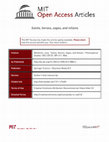Papers by Julia Markovits
The Routledge Handbook of Practical Reason, 2020
This essay examines the thought that our right actions have moral worth only if we perform them f... more This essay examines the thought that our right actions have moral worth only if we perform them for the right reasons. On the face of it, views about the conditions of moral worth seem independent of what first-order moral views we hold. That is, we can debate what else must be true of right actions for them to count as morally worthy without first settling the

Australasian Philosophical Review, 2020
ABSTRACT The target of John Broome’s critique is a certain kind of reductive project: that of red... more ABSTRACT The target of John Broome’s critique is a certain kind of reductive project: that of reducing the property of rationality to that of normativity, or the property of being rational to that of being as we ought or have conclusive reason to be. Broome argues that this reductive project fails, because the identity claim on which it rests is false. Rationality, he argues, supervenes on the mind: two people who are mental duplicates are necessarily also rational duplicates. But normativity, or reasons-responsiveness, or being as we ought to be does not supervene on our minds: two people who are mental duplicates may not be normative duplicates. I am interested in the appeal of and prospects for the opposite reduction: of reasons, or normativity, understood as the property of being how one ought to be, to rationality. But because this reduction also entails the identity claim that Broome rejects, its success also depends on addressing Broome’s worries. This commentary has two aims: first, to motivate the project of reducing normativity or obligation or reasons to rationality, by bringing out what is attractive about it; and second, to argue that the project is not simply a non-starter, by taking up Broome’s challenge to the identity claim: like rationality, I argue, normativity, too—or at least the species of normativity that the reductive project targets—does supervene on the mind.
Oxford Scholarship Online, 2018
This chapter develops an internalist defense of the claim that we all have most reason to be mora... more This chapter develops an internalist defense of the claim that we all have most reason to be moral, drawing on Kant’s argument for his “formula of humanity,” which states: “so act that you use humanity, whether in your own person or in the person of any other, always at the same time as an end and never merely as a means.” It argues that rational pressure to form maximally coherent, systematically justifiable sets of ends gives us all reason to respect others as ends in themselves—reason that cannot be outweighed by our reasons to promote our own optional ends. It defends the Kantian argument against some prominent objections.
Philosophy and Phenomenological Research, 2016
Philosophy and Phenomenological Research, 2016
This is a reply to commentaries by David Sobel and Stephen Kearns on my book Moral Reason, for a ... more This is a reply to commentaries by David Sobel and Stephen Kearns on my book Moral Reason, for a symposium coming out in Philosophy and Phenomenological Research.
New Waves in Metaethics, 2011
Internalist theses, as they are usually stated, describe a necessary relation between an agent’s ... more Internalist theses, as they are usually stated, describe a necessary relation between an agent’s having a reason and some other, usually motivational, fact about the agent. So, for example, internalists might claim that an agent can have a reason to perform some act only if he has a relevant desire, or only if he would be motivated to perform it in suitably idealized circumstances. Why should we accept internalism about reasons?
Oxford Studies in Metaethics, 2011

The Philosophical Review, 2010
This essay examines the thought that our right actions have moral worth only if we perform them f... more This essay examines the thought that our right actions have moral worth only if we perform them for the right reasons. It argues against the view, often ascribed to Kant, that morally worthy actions must be performed because they are right and argues that Kantians and others ought instead to accept the view that morally worthy actions are those performed for the reasons why they are right. In other words, morally worthy actions are those for which the reasons why they were performed (the reasons motivating them) and the reasons why they morally ought to have been performed (the reasons morally justifying them) coincide. The essay calls this the Coincident Reasons Thesis and argues that it provides plausible necessary and sufficient conditions for morally worthy action, defending the claim against proposed counterexamples. It ends by showing that the plausibility of the thesis, which it argues is largely independent of any particular ethical standpoint, gives us some reason to doubt ...

Philosophical Studies, 2012
This essay will explore the question of how to be good. But it will be more of a meander than a m... more This essay will explore the question of how to be good. But it will be more of a meander than a march: I won't be presenting any single, fully developed argument. Instead, I hope to explore a few different aspects of goodness that will, I believe, resist capture under any one definition. In short, there are several, importantly different, ways to be good. My starting point will be a thesis about moral worth that I defended in an earlier paper. 2 My goal (or one of my goals) in that paper was to examine the thought that morally worthy actions weren't just right actions, but rather were right actions performed for the right reasons. I argued, very roughly, that the right reasons were the right-making reasons: that an action was morally worthy if and only if the reasons motivating it coincided with the reasons morally-justifying it. My focus in this paper is a bit broader: here, I'm interested in morally admirable persons, as well as in morally admirable actions. But an account of what makes for a morally admirable person can, I think, be quite readily extracted from my earlier account of morally admirable actions. While I think that account gets at one important sense of moral goodness, I will argue that it (unfortunately!) fails to capture several other important ways of being worthy of admiration on moral grounds. Moral goodness is, I've come to believe, more multi-faceted than my earlier account suggested. (This should perhaps not be surprising. It's a fairly familiar philosopher's-instinct to try to come up with a neat formula to explain some central feature of the world. But it's an instinct that as often as not leads us astray.) My title is intended to capture some of that multi-facetedness: in the course of this essay, I want to think a bit about what saintliness (in a secular understanding of the term), heroism, and sagacity come to. To some extent, I use these as terms of art: our ordinary usage of these words is considerably more complicated, more ambiguous, and in some cases more specific than the way I will be using them in what follows. But I haven't just picked these labels to be cute-the variety of our common-sense moral ideals underscores the inadequacy of any one account of good character, and I think my discussion will help illuminate the distinct roles these ideals play in our everyday understanding of goodness. At the end of this essay, I will say something of a very exploratory and provisional nature about the flip side of these ideals: about villainy.
This is an overview of my book, Moral Reason, for a symposium on the book that is forthcoming in ... more This is an overview of my book, Moral Reason, for a symposium on the book that is forthcoming in Philosophy and Phenomenological Research.
This is a reply to commentaries by David Sobel and Stephen Kearns on my book Moral Reason, for a ... more This is a reply to commentaries by David Sobel and Stephen Kearns on my book Moral Reason, for a symposium coming out in Philosophy and Phenomenological Research.











Uploads
Papers by Julia Markovits
The first half of this book develops and defends a version of a desire-based, internalist, account of what normative reasons are. But does that account entail that there are no moral reasons that apply to all of us, regardless of what we happen to desire? It may look obvious that it does—that a bullet must be bitten somewhere. If what we have reason to do depends on what we antecedently desire, corrected only for misinformation and procedural irrationalities, and if desires differ from person to person, there seems to be no basis for assuming that everyone has reason to be moral. But the bullet may yet be avoided. The second half of this book shows how: it builds on Kant’s argument for his formula of humanity to provide an internalist defense of universal moral reasons. In doing so, it provides a more satisfying answer to the age-old question: why be moral?